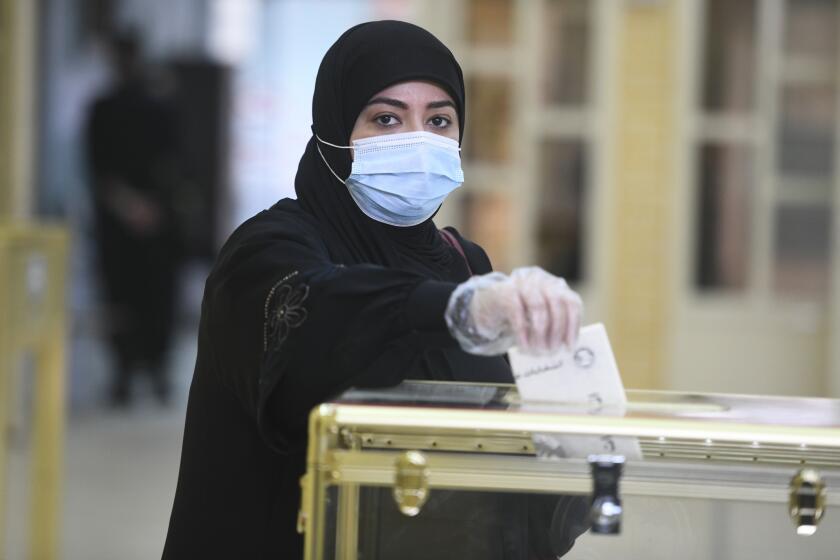Kuwaiti opposition returns from self-imposed exile after receiving royal pardon

- Share via
KUWAIT CITY — Several prominent Kuwaiti opposition figures have returned home from a decade of self-imposed exile after receiving amnesty from the ruling emir, a long-awaited move aimed at ending the political paralysis that has burned a hole in public finances.
Former lawmaker Faisal Muslim was the latest to be greeted early Tuesday by screams of joy from relatives and supporters who had gathered at the open-air diwaniya, the all-male customary Kuwaiti gathering. Attendees in traditional white robes and checkered headdresses crowded around Muslim, jostling to shake his hand.
Muslim is among several opposition Islamist lawmakers who were sentenced to prison for storming the Kuwaiti parliament amid the Arab Spring uprisings of 2011 as the government moved to grind out dissent. Like many others, he fled and had been living in exile in Turkey as Kuwait’s remaining opposition figures pressed the emir to issue a royal pardon and pave the way for their return.
The emir, Sheikh Nawaf al Ahmad al Jabbar al Sabah — successor to his half-brother, Sheikh Sabah al Ahmad al Jabbar al Sabah, who died in September 2020 — issued the amnesty decree earlier this month as tensions escalated between Kuwait’s fully elected parliament and the emir-appointed administration, with angry lawmakers using their limited powers to block the government’s economic reforms.
The royal edict pardoned and softened the sentences of nearly three dozen Kuwaiti dissidents. Well-known former opposition leader Musallam Barrak returned home last week to great fanfare.
The political deadlock has bred a worsening financial crisis in the wealthy, oil-rich sheikhdom, with Kuwait’s general reserve fund running dry. The parliament, meanwhile, refuses to let the government raise the public debt ceiling and drum up badly needed billions of dollars.
Kuwait is voting for its National Assembly, the first election since the death of its ruling emir as it faces economic problems amid the coronavirus.
As oil prices plummeted during the COVID-19 pandemic, the government continued to pay lavish public-sector salaries without addressing the widening deficit, prompting ratings agencies to downgrade Kuwait’s credit rating for the first time in its history.
After Muslim returned Tuesday, Kuwaitis celebrated with tea and a ceremonial sword dance.
“All the houses in Kuwait are very happy by the return of Muslim and those who were with him,” said Dokhi Hasban, one of the attendees. “The merciful mother ... embraces her sons regardless of their minds, their conceptions and their ideology.”
Many lawmakers, although deeply disenchanted by the political wrangling, say they’re energized by the return of key opposition figures.
Start your day right
Sign up for Essential California for the L.A. Times biggest news, features and recommendations in your inbox six days a week.
You may occasionally receive promotional content from the Los Angeles Times.
“The situation doesn’t encourage us to be in the National Assembly, but maybe we could have another political role ... like as a party or organization,” said former conservative lawmaker Waleed Tabatabaie. “We should benefit the youth by our experience.”
Kuwait stands out among Persian Gulf sheikhdoms for its full-throated parliament and history of lawmakers publicly criticizing official corruption.
More to Read
Sign up for Essential California
The most important California stories and recommendations in your inbox every morning.
You may occasionally receive promotional content from the Los Angeles Times.










